The Complete Guide to The Most Effective Sales Interview Questions
Melissa Williams
Contents
- How to Use Sales Interview Questions to Uncover the Truth
- Questions That Test for Commitment
- How to Find Out If They Have a Clear Understanding Of the Job
- How to Test for Accountability Beyond Their First Few Days
- Getting to the Bottom of Whether There’s A Culture Fit
- Are They Eager to Learn or Prone to Be Lazy?
- Question That Forecasts Their Receptiveness to Coaching
- How to Test for Problem-Solving Skills in a Sales Interview
- Would They Be Empathetic On The Job?
- Predicting Their Ability to Impact
- How to Tell Whether Your Candidate Can Tell a Good Story
- How to Breakthrough the Polish and Access Their True Mentality
Inside sales is an effective strategy only when you hire the right candidates by asking targeted sales interview questions.
Here’s what the flip side of that looks like:
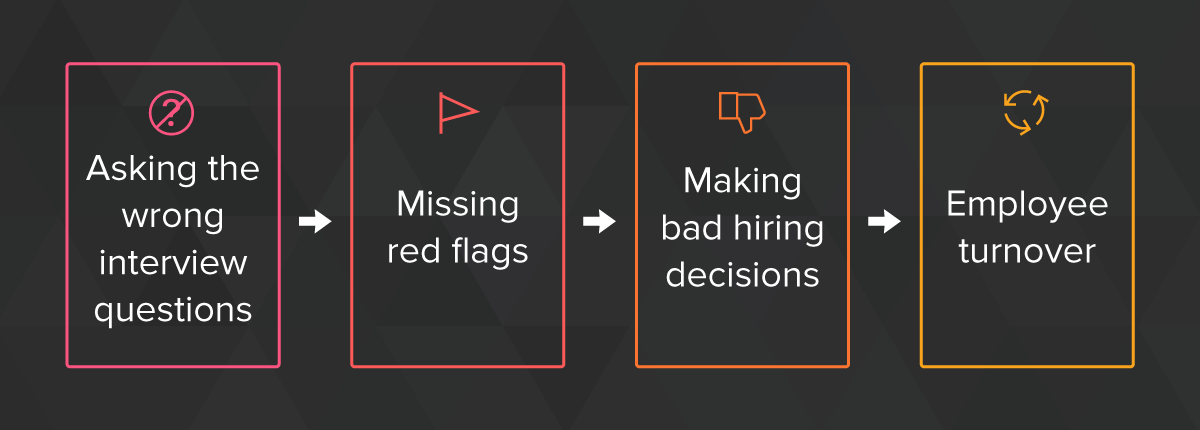
It’s a domino effect.
Every time an entry-level employee leaves, it costs a company 30-50% of that person’s annual salary; for mid-level sales employees, termination costs 1.5x each person’s annual salary.
That’s a lot of money walking out the door. So don’t let it.
Hiring candidates who are qualified and have clear expectations going into the job are more likely to become engaged employees. Here’s why that matters:
- Engaged employees are four times less likely than the average person to quit.
- Highly engaged workforces outperform their peers by 147%.
How to Use Sales Interview Questions to Uncover the Truth
Below are 29 questions and answers to help teams find the right candidate, every time.
Questions That Test for Commitment
If reps aren’t committed to their job, odds are they’ll leave.

According to a Q1 2016 Glassdoor report, 60% of employees 18-34 years old (and 62% of employees aged 35-44) are confident that they can find a job in the next six months.
Below are some of the best questions to determine whether a candidate’s attachment is to a specific sales role or to a general steady income.
Pro tip: Use this job description template to bring in more qualified candidates from the get-go.
1. “What is your ultimate career aspiration?”
Hiring managers: Make sure they’re sure about this whole sales gig thing.
Sales reps: Don’t go to a sales interview if you have reservations about sales as a career track. If you do make it to the in-person, give your interviewer a real answer to this question—think, what drew you to sales and why is it your future?
2. “Why us?”
Hiring managers: If your candidate stumbles on this one, it’s likely they’re there for the shot at getting a job (any job). Chances are they’ll leave when the next best thing comes around. To put this hiring mistake into perspective, employee turnover cost the U.S. 59.8 million dollars from 2015 to 2016.
Sales reps: This one’s a top sales interview question. Know why you want the company, not just the job description. Check out their mission and values to find where your passions align.
3. “What’s one thing you think our company can improve?”
Hiring managers: Did they care enough to research beyond basic interview prep?
Sales reps: Don’t cop-out, because there’s always room for improvement. Take a look through the company’s product or service description on their website to get an idea of how it works. For SaaS companies, you can also go through a product tour, check review sites like G2Crowd, and try a trial of their product.
4. “What questions do you have for me?”
Hiring managers: Ask this one as you wrap up. You know the drill: they should have some.
Sales reps: This is your opportunity to show that you’ve done your homework. Not coming prepared with your own interview questions makes you look unprepared and indifferent about the position. The best questions are open-ended, like:
- How does management measure success?
- What is one thing you’d like to see this role accomplish in the first six months?
- What are some of the reasons why you love working here?
- Where do you see the company in ten years?
How to Find Out If They Have a Clear Understanding Of the Job
Six out of ten employees feel that the job they’ve chosen doesn’t align with what they actually interviewed for.
And it drives them to quit.
According to an Equifax report, 41.55% of employees who recently left their job decided to do so within their first six months.
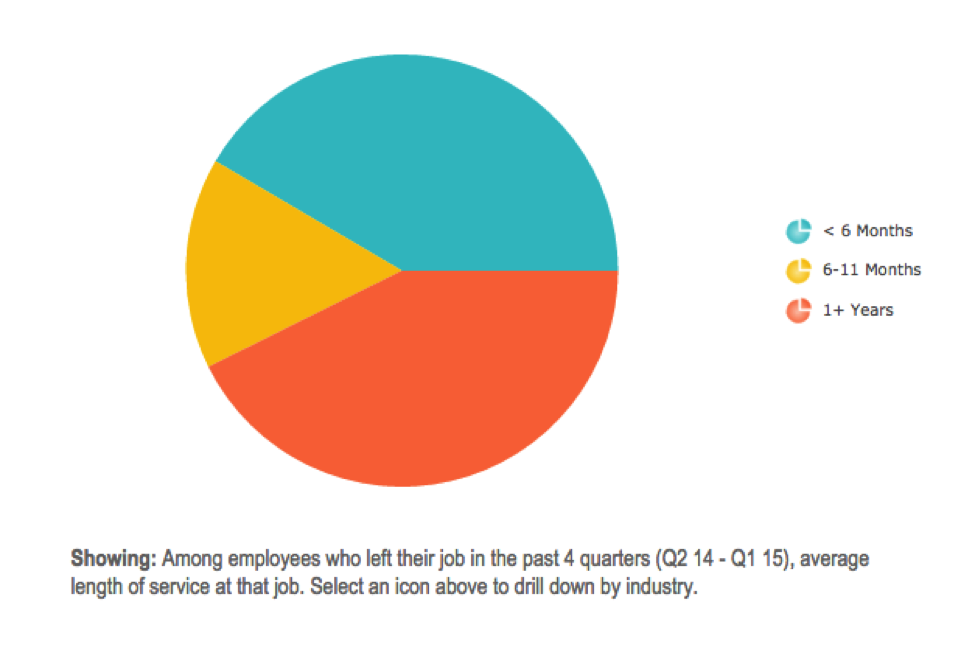
Employee turnover findings from Equifax
The questions below make sure you’re both on the same page with what the role entails.
5. “What do you foresee the daily role of this position as?”
Hiring managers: If there are any discrepancies, follow up with the correct information. Is it unsettling to them?
Sales reps: This one sounds straightforward, but many sales candidates forget to do one simple thing before walking into their interview—review the job description! As a starting point, pick the top three things you’re excited to do.
6. “How would you describe our company based on what you’ve seen so far?”
Hiring managers: Does the candidate have the right goals and values in mind?
Sales reps: Show them you’ve put in research time. Talk about what the company sells, who they sell to, and what problems they solve for. You can also check out the company on a prospecting tool like Owler to see their competitors and funding history.

7. “What is your least favorite part of the sales process?”
Hiring managers: Make sure they don’t dislike a responsibility you’re hiring for.
Sales reps: Have an answer, but work it into a positive (kind of like that tricky “biggest weakness” question). For example, you might not like playing catchup to more tenured peers on your team, but you thrive from the motivation of wanting to do better, and learning from others’ successful strategies makes yours that much stronger.
Happy employees are 12% more productive and produce 37% greater sales.
The following are behavioral interview questions that make candidates think on their feet. They are the secret weapon hiring managers use to cut through the bravado of prepared answers.
8. “Tell me about a time when your attitude at work wasn’t where you thought it should be.”
Hiring managers: Even the most optimistic employee has a bad day.
If your candidate can’t come up with an answer to this one, they aren’t being honest with themselves or with you.
Listen for: Were they able to adjust their attitude before it negatively affected their work or peers?
Sales reps: This isn’t a trick question; give a genuine answer. Use your story to your advantage to show that you have self-awareness and grow from experiences.
9. “Why are you looking to leave your job?”
Hiring managers: Are they leaving for the right reasons? You can walk through their resume and ask why they left prior jobs to ultimately uncover whether they gave notice or were let go and if they left professionally.
Sales reps: Speaking poorly of former employers or jobs makes 62% of recruiters question a candidate’s professionalism and attitude. Instead, show your sales interviewer that you are leaving to move forward and to grow. Your point: you’re stable, loyal, and reasonable.
How to Test for Accountability Beyond Their First Few Days
The highest performing sales reps are the ones who are accountable. Here are the best sales interview questions that test for this sales skill:
10. “A manager leaves sensitive info up on their computer, and an employee walking by sees it. Who is at fault here, and why?”
Hiring managers: Listen for an answer that tries to empathize with both sides and come to a solution, rather than viewing things as black and white and placing blame without investigating.
Sales reps: Give an answer, but be diplomatic. Instead of just choosing a party as being at fault, ask questions to learn more. And try to give a resolution to the situation with your answer.
11. “Tell me about a time when it was necessary to admit to others that you made a mistake. How did you handle that?”
Hiring managers: Job candidates who struggle to admit when they’re in the wrong tend to be stubborn, difficult to work with, and have a “fixed mindset” that hinders their own growth.
Sales rep: You need to be comfortable with failure to be successful in a sales role. Admitting mistakes shows you have integrity. Think of a story that shows your ability to admit when you’re wrong and to move forward.
Getting to the Bottom of Whether There’s A Culture Fit
Hiring an employee with a good culture fit makes turnover 27.2% less likely to happen within their first 18 months on the job. Below are sales interview questions that make sure a candidate makes a good fit for a sales role.
12. “How would you describe your perfect work environment?”
Hiring managers: make sure they’re comfortable making calls in front of peers, thrive in social working environments, and can concentrate when it’s loud around them.
Reps: What kind of office place, team dynamic, and management style do you like? Research the company’s Careers page and Glassdoor to learn more about their work environment. Be sure that it fits your style before going in for an interview.
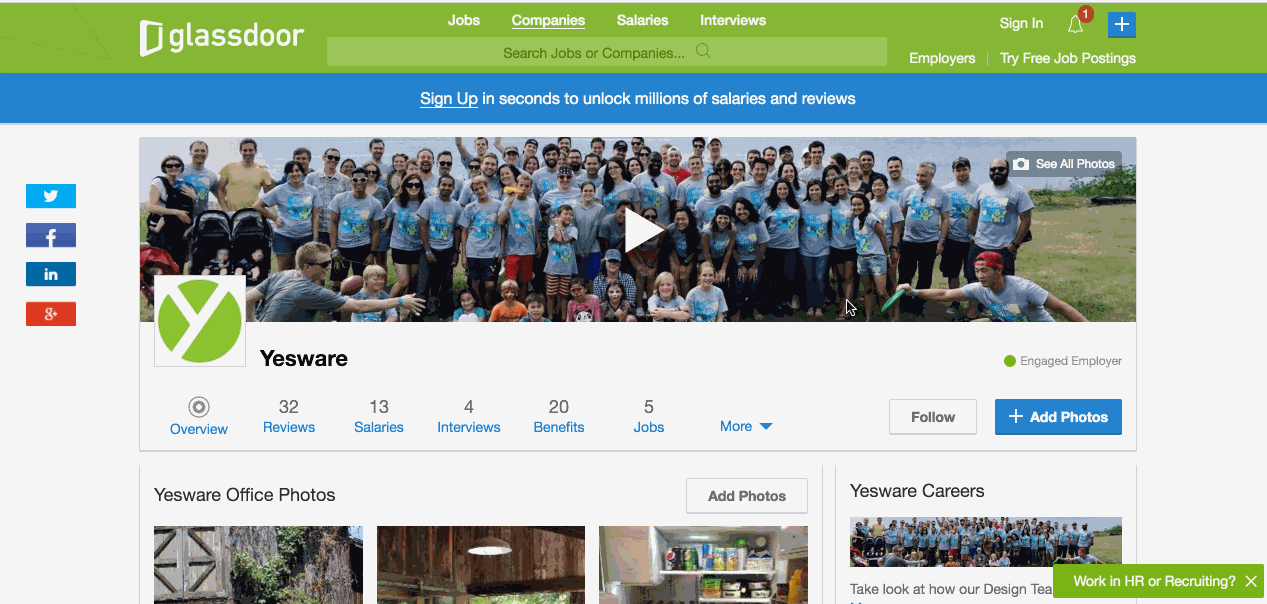
13. “Walk me through a time when you worked for an organization where you felt the culture fit was bad. Why was it a bad fit?”
Hiring managers: This sales position interview question promotes open, honest feedback from candidates. It also tests the waters so see if they’ll badmouth a former employer (red flag).
Sales reps: Instead of focusing solely on the negatives as you answer, emphasize the positives to show your maturity. How did the “bad fit” help you learn about yourself and grow forward?
Are They Eager to Learn or Prone to Be Lazy?
Being proactive separates the strongest salespeople from the rest of the pack. In a recent study, eighty-four percent of top performers score very high in achievement orientation.
Here are interview questions that uncover a sales candidate’s motivation to grow:
14. “Are you currently reading a job-related book? If so, which one?”
Hiring managers: Can they think of anything? Make sure they take steps to learn on their own.
Sales reps: This question offers a quick glimpse into your personal life and gives you the opportunity to stand out. It’s also a chance to pause and build rapport with your interviewer.
15. “What’s a tech tool you figured out how to use on your own?”
Hiring managers: If they’re tech-savvy, they’re much more likely to quickly adopt your CRM, any inbox plug-ins, and other productivity tools your sales team uses in its day-to-day.
Sales reps: Flex your tech muscle. High-performers are 8 times more likely to be heavy tech adopters than their underperforming peers.
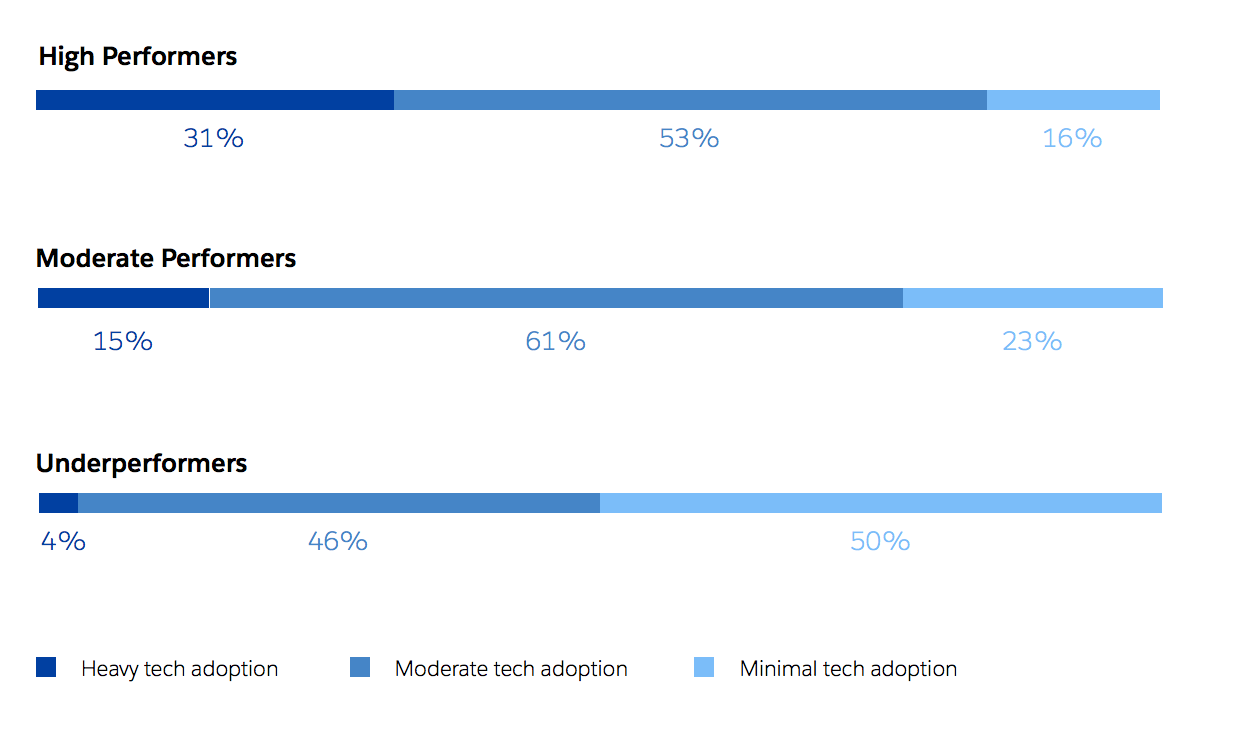
Salesforce research report
16. “What is one technical area that you’re eager to learn? How would you become an expert and stay one?”
Hiring managers: It’s a red flag if they’re stumped on answering either part of this question.
Sales rep: This one’s pretty straightforward. Just make sure you have a plan for 1) proactively learning in the beginning, and 2) staying an expert over time.
17. “Have you ever asked a prospect you lost why they chose not to buy? What did you take away from that experience?”
Hiring managers: Analytics are important, but so is information-gathering. Do they take the initiative or wait to be asked?
Sales reps: Ideally, you have indeed done this before. If you haven’t, talk through how it could be beneficial.
18. “What does your ideal first 30 days in this role look like?”
Hiring managers: Does the candidate plan to take the lead in learning the company, product or service, competitors, and productivity tools, or would they expect others to teach them?
Sales reps: Be proactive in your plan. Mention your interest in learning from others by shadowing and asking questions. You should also demonstrate your willingness to put in the time and effort to get yourself familiarized.
Question That Forecasts Their Receptiveness to Coaching
When sales reps are coached by their managers and open to feedback, it increases sales performance by 17%.
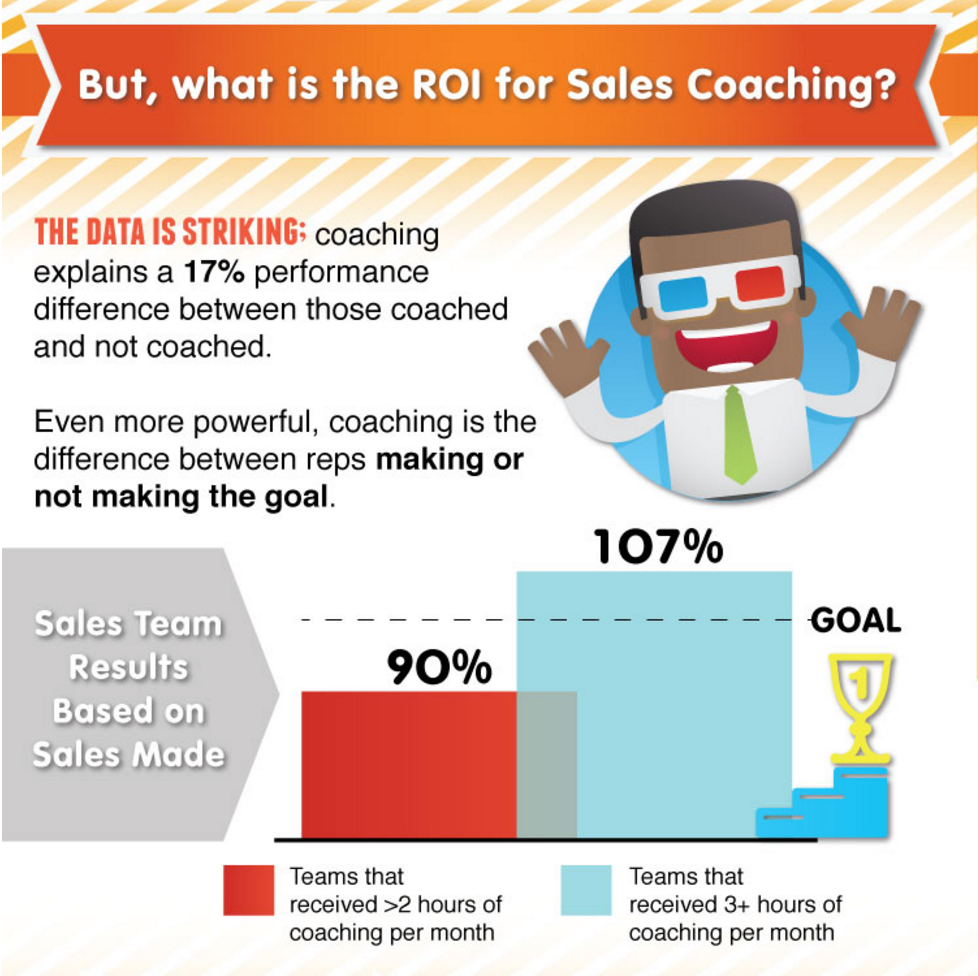
Salesforce Blog
Here are sales interview questions and answers to score coachability:
19. “Tell me about a time you received criticism and how you dealt with it.”
Hiring manager: Did they take it personally? Were they defensive?
Sales rep: You need to know how to learn from failure, or you won’t make it in sales. This isn’t the time for a cliche answer where your criticism was actually something positive (i.e. “I’ve been told I work too much”). Instead, show how criticism helped you adjust your behavior and learn.
How to Test for Problem-Solving Skills in a Sales Interview
Whether you’re sending a “problem-agitate-solve” cold email or you’re consulting a prospect during a sales call, you need to be able to show your prospect you can solve a problem for them.
Here are sales interview questions to detect this talent:
20. “Give me an example of a team disagreement you’ve had. How did the team resolve the issue? What part did you play?”
Hiring managers: The last piece to this question is the most important. They can watch a solution sweep away a problem, but actually finding and executing the solution isn’t so easy.
Sales reps: Human interaction inevitably leads to conflict. Getting past it is what’s important. Success in a new role requires that you can understand perspectives, communicate, take action, and remain calm. Showing you have those abilities to win the offer.
21. “Tell me about a time you caused a miscommunication with your team and how you managed it.”
Hiring managers: It should be easy for your candidate to think of a time when their writing, speaking, or non-verbal communication conveyed the wrong message to someone they worked with.
Pay attention to this: Are they able to be open up with a candid answer? Did they take action to resolve the issue as soon as possible?
Sales reps: No one can have perfect communication 100% of the time, and making a mistake actually makes you more likeable.
Instead of polluting your appearance, being honest impresses interviewers; it shows your ability to admit, resolve, and learn.
Would They Be Empathetic On The Job?
Sales reps who lack the empathy card fail because they’re focused only on their own agenda. They agitate prospects and close bad-fit deals that quickly churn.
You need to be able to understand your customer’s point of view to build trust, close mutually beneficial deals, and retain them. Here’s how to find out if your candidate can do that:
22. “You’re walking down the street, and the person behind you bumps into you with a quick apology as they push past. How do you react?

Hiring managers: You want someone who understands that the person might’ve been in a rush for a reason, and can let it go. Be wary of people who immediately get angry or would react before thinking.
Sales reps: Being able to roll with the punches strengthens your character and makes you a successful seller. The ideal candidate would be understanding in this hypothetical situation. As a salesperson, minor setbacks can lead to better final outcomes, but you need perseverance and a positive attitude.
23. “If business priorities change, describe how you would help your team understand and carry out the shifted goals.”
Hiring managers: Would your candidate be able to move past their own personal frustration?
Sales reps: A good approach would be to make sure all of the affected people know, to find out why it happened, and to stay confident. You want to show an employer that you’re committed and flexible while also thinking through the situation with an analytical eye.
24. “A prospect you’ve been pursuing goes dark and then eventually tells you they chose a competitor. What do you do?”
Hiring managers: The best candidates will understand that the realistic option is to accept and respect this decision (for now), and do what they can to provide value as an industry expert.
Sales reps: Pushing back on your prospect at this point would chafe and likely destroy the relationship. Don’t just give up on the relationship entirely, but be smart.
25. “If you ran your own company, what kind of people would you hire, and why?”
Hiring managers: This is a good sales interview question to measure emotional intelligence. Beware of someone who seeks out a homogeneous environment.
Sales reps: An empathetic employee understands the importance of diversity and the necessity for roles on teams to be filled by people with unique abilities.
Predicting Their Ability to Impact
At the end of the day, salespeople have quotas to hit. They could have all the other sales skills in the book, but if they lack this one, they won’t last.
26. “Walk me through a time when you had a measurable impact on a job or organization.”
Hiring managers: Do they understand that you’re asking for a numbers-driven example?
Sales reps: Metrics-driven people are the most successful in a sales role. Think of an achievement with data to back it (bonus points if it’s sales-related and it impacted a company’s bottom line). You could also use a situation in which you influenced a team internally—but tie it to a hard metric. Hint: use the STAR framework.

How to Tell Whether Your Candidate Can Tell a Good Story
Telling a story captivates your audience and is a proven sales tactic to build trust.
27. “Teach me about something as if I have never heard it before.”
Hiring managers: Are they able to do this off the cuff, or does it take a few moments?
Sales reps: Time is money. The best stories make it interesting for you and get the point across at the same time. Quick tip: start by asking them a question that will help you better understand their perspective, and then make it relatable.
How to Breakthrough the Polish and Access Their True Mentality
High-performing sellers are three times more likely than underperformers to value a team-selling mindset. Here are sales interview questions and answers that cover this mindset:
28. “What types of teams have you worked with in the past?
Hiring managers: If they can’t think of a team they’ve worked on, you have a problem.
Sales reps: You need to show you’re a team player. Even if this would be your first job out of school, come up with a team example from a class project, a sports team, or another intramural activity. At tech companies like Yesware, closing a sales deal involves coordination with product, finance, customer success, and a custom solutions team.
29. “What are the top three factors that you would attribute to your success in life?”
Hiring managers: If they’re selfless, they’ll attribute their accomplishments to others.
Sales reps: Egotistical candidates will pat themselves alone on the back. Make sure to give credit to the outside people in your life that have contributed to your achievement.
In the end, while forty percent of companies today are increasing their inside sales headcount, the average turnover rate is 19%. Make sure you hire the right person from the start, so you don’t have one in five hires walking out the door within a year.
Get sales tips and strategies delivered straight to your inbox.
Yesware will help you generate more sales right from your inbox. Try our Outlook add-on or Gmail Chrome extension for free, forever!
Related Articles
Casey O'Connor
Casey O'Connor
Casey O'Connor
Sales, deal management, and communication tips for your inbox

